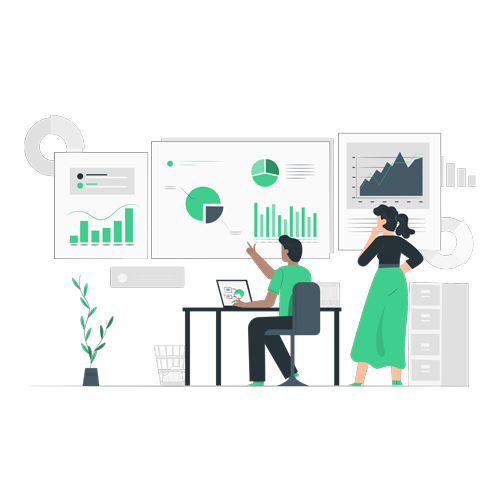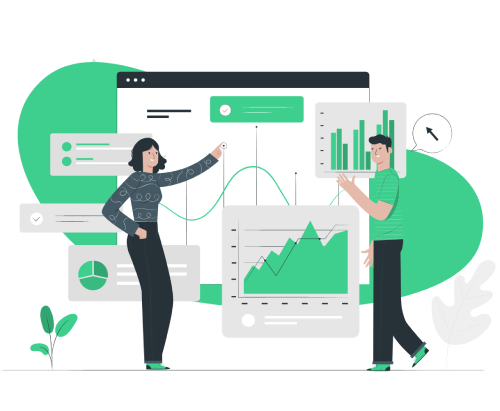BI Software
BI Software: Simplify Your Decision-Making Optimization
Business Intelligence (BI) is revolutionizing the way companies manage and utilize their data. By transforming raw figures into actionable insights, BI enables organizations to better understand their environment, track their performance, and make strategic decisions. In this article, we will explore the ins and outs of BI, highlighting its benefits and providing essential tips for choosing the tool that best suits your needs. Additionally, we will introduce Axelor’s BI software, a powerful platform that simplifies decision-making through advanced data analysis tools, interactive dashboards, and customization.
Summary
Definition of Business Intelligence (BI)
Business Intelligence (BI), also known as business analytics, is a collection of technologies, business processes, and applications designed to gather, analyze, and present relevant data and information to help businesses make informed decisions and improve their performance. A BI tool aims to transform raw data into actionable insights, enabling companies to better understand their environment, track their performance, identify trends, and make strategic choices.

Examples of Business Intelligence (BI)
Interactive Dashboards: Companies use interactive dashboards for real-time visualization of their financial data, sales, key performance indicators (KPIs), and other crucial data. For instance, a sales dashboard can display charts and figures to help managers track daily, monthly, or annual sales performance.
Automated Reports: Automated reports are regularly generated by the tool to provide insights into sales, inventory, revenue, pricing, etc. These reports help executives monitor progress and make informed decisions. For example, a profitability report can show which product lines are the most profitable.
Data Mining: Companies use data mining to uncover trends and hidden insights within their data. For instance, a retailer might use data mining to identify the shopping habits of its customers and tailor its offers accordingly.
Predictive Analysis: Predictive analysis employs statistical models and algorithms to forecast future trends. For example, an e-commerce company might predict which products will be most popular during the holiday season by analyzing data from previous years.
Social Media Analysis: Companies use BI to track and analyze conversations and comments on social media. This can help assess brand reputation, understand customer opinions, and identify potential opportunities or issues.
Decision Support Systems (DSS): DSS are BI systems that assist managers in making significant actions by providing relevant information and real-time analyses. For example, a DSS can help a Chief Financial Officer decide whether to invest in new equipment.
HR Dashboards: Companies use an HR dashboard to track data on workforce numbers, employee performance, compensation, and other aspects related to human resources. This can assist HR in managing recruitment, retention, and employee development.
Discover our ERP for Human Resourceskeyboard_returnBI (Business Intelligence) Software: Key Points to Consider Before Getting Started
Before adopting a Business Intelligence (BI) software, several crucial points must be considered. First, it is vital to clearly define the objectives and specific needs of the business in terms of data analysis. Next, evaluating the software’s compatibility with existing applications, as well as its ability to process and secure sensitive data, is essential. Additionally, training staff for effective BI use and regularly monitoring performance are indispensable steps to ensure the success of the BI initiative within the company.


BI Software: Understanding Your Needs and Environment
To choose the right Business Intelligence (BI) tool, it is essential to precisely understand the needs of the business as well as its environment. This begins with an in-depth analysis of the objectives and specific areas where data analysis can add value. It’s also crucial to evaluate the solution’s ability to integrate seamlessly with existing systems, ensure data security, and meet compliance requirements. A thorough understanding of needs and the environment will enable the selection of the most suitable BI solution to optimize decision-making and enhance business performance.
Why Do Business Intelligence?
Business Intelligence (BI) offers numerous benefits for businesses, which explains why it is widely adopted across many sectors. Here are some key reasons:
Informed Decision Making: BI provides leaders and decision-makers with factual information and in-depth analysis, enabling them to make more informed and data-driven decisions rather than relying on guesswork.
Performance Optimization: By analyzing operational, financial, and commercial data, BI helps identify inefficiencies, opportunities for improvement, and trends to leverage for optimizing company performance.
Trend and Opportunity Detection : BI aids in identifying market trends, customer behaviors, growth opportunities, and potential threats, enabling companies to swiftly adapt to a constantly changing environment.
Monitoring Key Performance Indicators (KPI): BI dashboards allow for real-time monitoring of essential KPIs, facilitating proactive performance management and the correction of issues as they arise.
Better Resource Control: By better understanding the needs for human, financial, and material resources, companies can allocate their resources more effectively, thereby reducing unnecessary costs.
Productivity Improvement: BI can automate many tasks related to data collection and analysis, freeing up time for employees to focus on higher-value tasks.
Customer Satisfaction Optimization: By analyzing customer data, BI helps to understand customer preferences, needs, and behaviors, enabling the offering of more tailored products and services, and strengthening customer loyalty.
Risk Management: BI enables the early detection of potential risks, whether related to fraud, regulatory compliance, or data security, allowing for a swift response to mitigate these risks.
Measuring Return on Investment (ROI): Companies can assess the effectiveness of their initiatives and investments by using BI to track costs and benefits, aiding in making future choices.
Competitive Advantage: BI enables companies to better understand their market, competitors, and customers, which can provide a competitive edge by identifying opportunities that others may miss.
What are the objectives of business intelligence?
The objectives of Business Intelligence (BI) are diverse and aim to improve decision-making within companies and organizations. Here are some of the main objectives of BI:
- Access to Relevant Data: BI aims to provide easy access to relevant and up-to-date data, regardless of where it is stored, to enable decision-makers to have the necessary information to make informed decisions.
- In-depth Analysis: This tool enables deep analysis of figures, identifying hidden trends, patterns, and correlations. This helps in understanding past performance, forecasting future outcomes, and identifying potential opportunities or problems.
- Cost Reduction: It can help identify inefficiencies and wastage, thereby reducing operational costs and optimizing budgets.
- Competitive Advantage: By effectively leveraging data, BI can help a company gain a competitive edge by identifying market opportunities, improving customer satisfaction, and anticipating market needs.
- Regulatory Compliance: For businesses subject to strict regulations, it can help ensure compliance by providing the necessary reports and data to meet legal requirements.

What are the benefits of Business Intelligence?
Business Intelligence (BI) offers numerous benefits to companies, making them more competitive and improving their decision-making. Here are some of the key benefits of BI tools:

- In-depth Analysis: The ability to explore and analyze complex data allows for the discovery of trends, patterns, and valuable insights that would otherwise go unnoticed.
- Cost Optimization: Data analysis helps identify areas where savings can be made by reducing unnecessary expenses and improving cost control.
- Report Automation: BI automates report generation, saving users time by eliminating tedious manual tasks.
- Enhanced Collaboration: BI facilitates collaboration by allowing teams to share data, analyses, and reports in real time.
What are the main types of BI software?
Business Intelligence (BI) software comes in several categories based on their specific applications and objectives. Here are some of the main types of BI tools, including Axelor’s:
• Reporting Systems: These software solutions enable the generation of static or dynamic reports from data. They are often used to present information in the form of tables and charts for the user.
• Dashboards and Data Visualization: These applications are designed to create interactive dashboards and data visualizations, which facilitate the understanding of information.
• Ad Hoc Analysis: These tools offer the capability to create custom analyses on the fly, allowing users to explore data in depth.
• Data Mining and Data Exploration: These tools specialize in discovering hidden patterns and trends in data, which can be useful for strategic decision-making.

• Planning and Budgeting: These software solutions enable the creation, management, and tracking of budgets and business plans.
• Data Integration: These solutions facilitate the aggregation and transformation of data from various sources, enabling a comprehensive overview.
• Self-Service BI: These tools aim to make data analysis accessible to non-technical users, allowing them to create their own reports and analyses.
• Enterprise BI: These solutions are designed to meet the needs of the entire organization, providing reporting, analysis, and data monitoring functionalities. Axelor's BI tool falls into this category and offers a comprehensive solution to users for data management and business analysis, with modules for Customer Relationship Management (CRM), sales tracking, accounting, marketing, and other functions.
What is the cost of a Business Intelligence software?
The cost of a Business Intelligence (BI) software can vary significantly depending on several factors, including the size of the company, required features, system complexity, and pricing model. Here are some considerations regarding the costs associated with a BI tool:
- Software Licenses: Many BI software solutions are sold as licenses. The cost will depend on the number of users or seats, included features, and customization options.
- Installation and Configuration Fees: The installation and configuration of the software may require professional services, especially to customize it according to the company’s needs. These services can represent an additional cost.
- Training: Training staff on the use of BI software is often necessary and can incur training costs, especially if the software is complex.
- Maintenance and Technical Support: BI tools generally require ongoing maintenance for updates, security patches, and technical support. Maintenance prices are often expressed as a percentage of the initial license cost.
- Infrastructure-Related Costs: If the BI software is hosted on-premises, there may be costs associated with the necessary hardware infrastructure and servers to run it. Cloud-based solutions typically have monthly or annual subscription costs.


- Data Source Connectivity Fees: To extract data from various sources (databases, files, APIs, etc.), connectivity fees may apply, especially for software that requires specific connectors.
- Dedicated Personnel: Some companies may need to hire or train dedicated staff to manage and administer the BI system, leading to additional costs.
- Customization and Development Options: If the company has specific needs not covered by the standard features of the software, customization or bespoke development costs may be necessary.
- Migration Costs: If the company is migrating from one BI solution to another, there may be costs associated with migrating data, reports, and dashboards.
Ready to optimize your decision-making with BI software?
Axelor offers a Business Intelligence (BI) solution that can significantly enhance your decision-making by effectively leveraging your company’s data. By choosing Axelor BI, you benefit from several advantages, including interactive dashboard visualizations, impactful data visualizations, and advanced analytics features. This solution, integrated into its Open Source ERP, enables you to explore your data in depth and identify crucial trends.
Additionally, Axelor offers the possibility to customize your BI solution according to your specific needs, ensuring seamless integration into your operational environment. With connectivity to various data sources and the ease of use of the platform, Axelor simplifies the analysis process and enables your business to maximize the value of its data.
In summary, Axelor BI represents a powerful solution for optimizing decision-making within your company by providing advanced BI tools, flexible customization, and extensive data connectivity. Are you ready to unlock the full potential of your data for improved performance? Axelor can support you in this endeavor.
Discover how our ERP can help improve your company’s performance
An expert will contact you shortly to discuss your project.